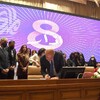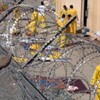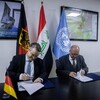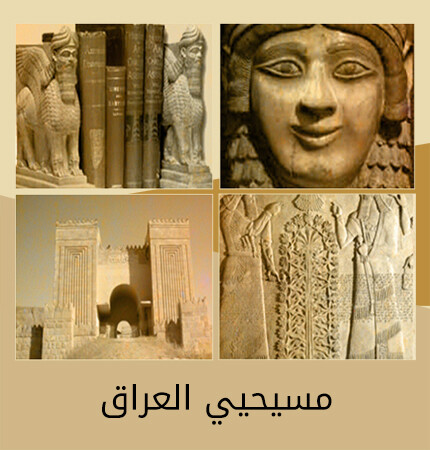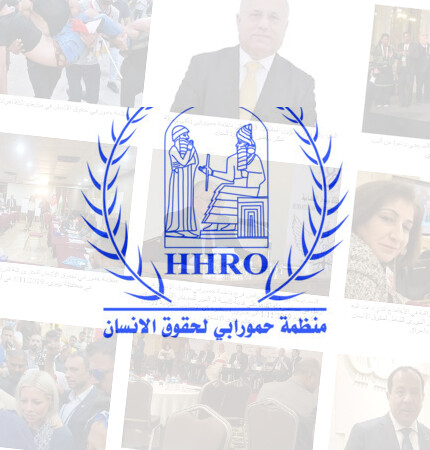 Facebook
Facebook
 Twitter
Twitter
 YouTube
YouTube
 Telegram
Telegram
During an interview with the American Time newspaper, Louis Merqus Ayoub points to the dangers threatening minorities post-liberation in the Nineveh province
·During an interview with the American Time newspaper, Louis Merqus Ayoub points to the dangers threatening minorities post-liberation in the Nineveh province.
·The dispute between the federal and regional government and the agendas of the political militias’ patronage which dominates the reality of the Nineveh province.
·The Nineveh province will be the victim of the Turkish and Iranian influence if there aren’t movements to guarantee minorities’ rights.
·Compensation, reconstruction and security guarantees under an international umbrella provides an opportunity for the IDPs to return.
The American Time newspaper had a lengthy dialogue with Mr. Louis Merqus Ayoub, vice-president of Hammurabi Human Rights Organization, member of the board of the Alliance of Iraqi Minorities Network and a member of the Hamdaniya (Qaraqosh) District Council, interviewed by Jared Malsin, the Time’s Middle East Office Manager, the two met when (A Panel was held by Hammurabi Human Rights Organization on 21/10/2016 in Erbil in order to attempt to amend Article 26 of the National Identity Law number 3 for 2016) when the vice-president of Hammurabi Human Rights Organization said:
“Today we have a workshop on Article 26 of the National Identity Law number 3 for 2016, which violates the rights of non-Muslim components such as Christians, Ezidies and Sabaean Mandaeans by converting Christian or Ezidi or Sabaean Mandaean minors to Islam when one of the parents converts to Islam, depending on few texts and made up arguments which there is no consensus upon by the Muslims.”
We are working with the rest of our colleagues in the Hammurabi Organization and the Alliance of Iraqi Minorities in order to strengthen the presence of minorities and promote the survival of these indigenous Iraqi components such as Christians, Ezidies, Sabaean Mandaeans and other components such as Shabak and kaka’is whom are subject to violations, either social or discriminatory carried out by security agencies or governmental legislations that encroaches upon their rights or religious, social, cultural, linguistic or national freedoms.
Staying in Iraq with my colleagues after being displaced from our territories for 2 years without liberation was because Iraq is our country, and we’re looking for a mechanism to stay by working to legislate a system of laws that could preserve our survival in our country, because today, everybody knows that more than 50% minority IDPs including Christians are abroad, this is not a positive indicator, it is a dangerous indicator that points to the disappearing diversity in Iraq. Therefore, we must work very hard with the International Community and the Patriotic Governments to find a mechanism to build trust first for these components to return to their territories in the Nineveh plain, Sinjar, Bashiqa, Bartella, Mosul and others, this requires much work on the legal, political and social levels, and we have many programs with numerous International Organization; United Nations, Norwegian, European and American organizations. Today, our work is part of this movement to amend Article 26 of the National Identity Law number 3 for 2016, this article has been copied from a former law which is the Civil Status Law where it included this text in Article 21 third paragraph, which states that non-Muslims area allowed to convert to a different religion but Muslims aren’t allowed to do so, the article also includes Islamizing minors if one of the parents converts to Islam which contradicts with the Iraqi constitution with Article 2 Paragraph C and it also contradicts with the Islamic jurisprudence which says (no coercion in religion) and it also contradicts with the Convention on the Rights of the Child which is ratified by Iraq and especially in the text that talks about changing religions in Paragraph 1 of Article 14 which states (States Parties shall respect the right of the child to freedom of thought, conscience and religion), this also contradicts with the principals of Human Rights and International Criteria which is referred to in the Universal Declaration for Human Rights and the two international covenants on Civil, Political, Economic, Educational and Social Rights.
Minorities have numerous fears from the political dispute between Baghdad and the Region, this reflects on the conditions of minorities in the Nineveh plain and Sinjar. We are worried that the scenario of Sinjar would be seen in the Nineveh plain as well because until this moment only about 5% of the people of Sinjar have returned.
In regards to the structure of administration in the Nineveh plain, I’d like to explain about the structure of the local administration of the minorities’ territories, where the governorate includes 9 districts and 22 sub-districts including Sinjar, TelKeif, Hamdaniya and its sub-districts with the sub-district of Bashiqa (Nineveh plain), these areas post 2003 have become under the control of the Kurdistan Region of Iraq when talking about security while it continues to be administratively part of the Nineveh governorate.
Due to this paradox in between security and administration of these areas, the area has be neglected to a large extent with respect to infrastructure of services in the mentioned locations due to the political dispute and the administrational contradictions, the area was deprived from its rightful funding enlisted in the budget due to the Kurdish Arabian conflict in these areas which continues until this day with no respect to the privacy of the people of these areas while keeping them away from participating properly in a way that would achieve their patriotic will in ruling and administrating their geographic territories and securing it with their own sons, the ones affected by these conflicts were the different members of minorities such as Christians, Ezidies, Kaka’is and Shabak.
I want to add that this Arabian Kurdish conflict played a large role in the fall of Mosul on 10/6/2014, and the withdrawal of the army and the Peshmerga from Sinjar, Mosul and the Nineveh plain without confronting Daesh and the same military group is fighting Daesh today, few military commanders who didn’t fight Daesh that day are fighting against it today in the liberation operations in Mosul.
·Why these military forces didn’t protect Mosul, Sinjar and the Nineveh plain from falling that day and today they are trying to do so?
- the possibility that scares minorities the most is if the political, administrative and security situation returns to what it used to be prior to 10/6/2014, while minorities currently and displaced and scattered around, they have a visions of how bad it would get in its territories, while they lost trust in returning home if there isn’t a new form of administration that could guarantee stability and prevent a demographic change which will provide prosperity and security, therefore we must listen to minorities when they present their visions and understandings in regards to what should be achieved and not asking for the help of certain personnel or Christians or Ezidi political parties whose members don’t exceed dozens and have no social credit but they represent the majorities’ political sphere such as the Arab and the Kurdish parties, we shouldn’t count on few religious characters that are loyal to this or that and who lost the trust of their components, this requires the participation of minorities including their serious organizations in order to have vision about the fate and future of their territories post liberation and prior to their return.
·Is there a possibility to have violations committed during the liberation of Mosul, do you know how far it would go against minorities and civilians?
War is war and there’s no clean war, during all wars you’ll find violations against civilians, but I expect this war to have the least amount of violations, because the liberation operations of Mosul is coordinated internationally and with the federal and regional government, passages have been opened for civilians to escape under the vision of the united nations and local organizations working in Human Rights and according to the international humanitarian law.
There was a precise decision for a number of factions that worked under the umbrella of the Popular Mobilization Units (PMUs) or what’s also called al-Hashed al-Sha’bi, which committed violations during the liberation of Fallujah, Salah Addin and Alfojah, the decision was to prevent these factions from participating in the main tasks of the Mosul liberation, and to make their tasks related to holding and securing the liberated lands and the second lines of advance during the liberation of the areas of the Nineveh plains, while the army advances with the national police to liberate the land, the Hashed al-Sha’bi committed violations in numerous locations where they participated in the liberation, and a number of violations were recorded as well where few Peshmerga soldiers looted furniture and other belongings in Telskuf, Sinjar and the Kaka’I villages, this was confirmed to us by a number of witnesses from the residents of these cities and villages after the liberation of their hometowns, therefore a decision was taken to keep these factions away from directly participating in storming these cities and liberating them which left a great positive result when talking about minimizing material loses which includes the furniture of the houses, which is also a positive move to restore trust through national reconciliation to alleviate the intensity of the disputes that will be aggravated post liberation and the secure of the area by the governmental military forces such as the army and the police which is more disciplined an unbiased compared to the Hashed al-Sha’bi.
·Are you worried about the participation of the Hashed al-Sha’bi in the liberation operation of Mosul?
Yes I’m worry about that, I’m warried that violations will be undertaken at the hands of the factions of the Hashed and especially in Tel-Afar, because the society in Tel-Afar is divided amongst itself, where the majority is Turkmen< and the majority and Sunni while the minority are Shi’ites, and the majority of the Hashed’s forces participating in liberating Tel Afar are from the people of that district whom were displaced by the Sunni Turkmen in Tel Afar and who caused much harm and misery to them, and today they joined the Hashed in different fighting battalions and the majority of the Sunni Turkmens from Tel Afar are amongst the Islamic State brigades (Daesh) and they didn’t only cause harm to the Shi’ites from Tel Afar only but had great role in managing terrorism in the center of the city of Mosul and the rest of the districts and that the majority of the leaders of the Islamic State were from the people of this district and from the Sunni Turkmen component, therefore we expect that revenge would be a major element of the fighting between the Hashed and the Islamic State militants and that there would be civilian casualties which would include the Ezidi captives living in Tel Afar.
What adds to our fears is the increasing statements exchanged between Tehran and Ankara about the battle of Tel Afar, the regional competition in the area and the indirect or direct intervention to support groups in Iraq will only complicate the situation furthermore and maybe violations against civilians will increase when many people of Tel Afar have joined the ranks of the Islamic State and had negative roles when dealing with the people of Mosul and its districts.
If such a clash takes place in Tel Afar between the Hashed and the Turkish forces, I expect the number of violations to be much bigger and clearer, but disastrous in form, size and quantity.
·What about the district of Hamdaniya “Qaraqosh”?
- Qaraqosh differs from Sinjar when talking about the type of buildings and the elite of its people when it comes to cultural and mental outcomes, the city contained a university and more than 40 different schools starting from kindergartens to elementary and middle schools, more than 45 thousand people lived there and had their agricultural and trading businesses, it’s the largest gathering of Christians in the Nineveh plain and Mosul, it’s the center of Christians in Iraq and the Middle East, and all the political agendas aimed to make this city an administrational center for the Nineveh plain.
The Hamdaniya district consists of three administrational units, the majority of the people of the district center are Christians and the Municipal Council of the district has 20 seats, Christians’ share is only 8 chairs while the rest of the chairs goes to Muslims including Shabak, Arabs, Turkmen and Kaka’is, because all the residents of the district had to be represented … the Christian majority became a minority as a result. And with 12 seats for Muslims this decision depends on them because they represent the majority in the Municipal Council, and as a result a conflict erupted between the Christian and the Shabaki component because they wanted to build a number of mosques, Husseinis and religious schools in the villages of Christians and not in their villages, that’s with the goal to have a demographic change in the center of the three Christians cities (Qaraqosh, Bartella, Karemlesh) by moving this components which is supported by regional powers and empowering the Muslim majority within the municipal council in the district of Hamdaniya (Qaraqosh). While the members of the Shabaki component offered support through the Shi’ite institution in Mosul and the Shi’ite Islamic Parties. And then we tried to prevent them from doing so and from carrying out this project and to convince them that building these mosques, schools and Husseinis in the center of the Christian villages will create an ideological and cultural clash and transform into conflicts that doesn’t establish for civil peace in between the components of the Nineveh plain, and that it’s better to build these Islamic temples in the Muslim villages that has Shi’ite Islamic privacy. Because we all know that Islamic teachings and the Sharia isn’t compatible with the culture and freedom of Christians. Muslim can’t accept to have a woman out without a guardian, they don’t want mixed schools, the ban liquor and other things that contradict with the culture and behavior of Christians.
In this context, the Christian presence prior to 2003 was about 1,300,000 people distributed in all Iraqi provinces and centered in Baghdad, Mosul and Basra, in Baghdad alone about half a million Christian citizens used to live and we had neighborhoods where the majority were Christians (Assyrians neighborhood, al-Dura, New Baghdad, al-Amin, al-Ghadir, Palestine street, Akd al-Nasara, Karradat Mariam, Kam Sara, Km Alarman and other neighborhoods), today only about 50 thousand Christian live in the city of Baghdad where more than 30 churches exist, and which is the headquarters of the Chaldean patriarchate in Iraq with less than 300 thousand as members, Qaraqosh was home to thousands of them.
·Do you think Christians will be able to go back to their homes after the liberation of Mosul?
- I think there won’t be a return for Christians to the center of the city of Mosul, and also to the center of the city of Telkief the return will be quite slow and nominal, they could probably return to the Southern Nineveh plain which includes Qaraqosh, Karemlesh and Bartella, and it’s possible in the Northern Nineveh plain which includes Telskuf, Batnay, Sharafiya and Baqofa, but this return will need many mechanisms to be accomplished:
1. to have real security in these areas, and this won’t be achieved but through serious security preparations, but what the security aspect requires in these areas is establishing trust in the security power that protects the people, the security protection could be consisted from the Christian groups formed from the sons of these territories, and that’s by unifying all these groups in one force linked to the government in Baghdad, and developing its defensive capabilities to more advanced levels, with the presence of international security experts and an international protection for 10 to 15 days, until these forces are experienced enough in the security management of these locations.
2. direct financial compensation to those harmed and whose properties and homes were damaged by daesh and the international alliance.
3. Dismantling the militias of all the components of the Nineveh plain, and linking these militias to one force under the umbrella of the federal government in Baghdad, because our fears are directed towards inner conflicts after the liberation in between minorities from the Christians, Shabak and Ezidies, therefore we think that unifying these militias in one force to protect the Nineveh plain through the federal government in Baghdad would be the best choice to ward off the danger of these conflicts. Maybe you wonder why should they be unifying in one force … the answer would be because these militias are divided in its political allegiance between being loyal to Baghdad, Erbil or the Hashed al-Sha’bi, Christians have militias following Baghdad’s orders and have other militias following Erbil’s and others following the Hashed’s, and thus the Shabak and the Ezidies are divided as well. Lacking a unified leadership with one vision for all these militias will result in worst conditions with its presence and these militias will be used by the political parties funded by its best interests with indifference to the interests or rights of minorities, and this is what we’re afraid of, and what we expect will happen, therefore, the international security element has to be present in the security grip that shall provide safety in these areas and to find a civil administrational structure that could protect these areas from the conflict.
·You say “Christians will return to the Nineveh plain, but they won’t return to Mosul upon being liberated …” I wonder what was the background you relied on for such a statement, how is the center of Mosul different from the Nineveh plain?
First of all, the majority of the residents living in the center of Mosul are Sunni Muslims.
Second of all, because the Islamic State, during the past 2 years, have raised two generations of children and young men whose ages are between 9 and 16 called the cubs of the Caliphate, taught and raised by the terrorist Daesh literature, those are willing to fight and to slaughter others, they are willing to commit suicide in a public place, these are the fears that encourages Christians and Ezidies not to return to the center of the city they were kicked out from after being stripped from all their money and belongings and their homes being confiscated while placing the letter نwhich stand for Nazarenes, this will be the case at least for the next 10 years.
Third of all, there are no serious national or international programs to change the curriculums in order to change the culture and the education, it is possible for minorities to return to the center of the city after 10-15 years because ideology must be fought with ideology, data indicates that the curriculums being taught currently and has been taught during the past year hold radical Daesh ideas towards minorities such as Christians, Ezidies and Shi’ites, because it approves killing these components, this type of fears prevent minorities from returning to Mosul upon its liberation, we are talking about a culture that has been pushed into the souls of thousands of children, there are more than 700 Ezidi children that have been captivated by the Islamic State and who holds Daesh ideologies in Mosul and are fighting alongside thousands of Muslim children and Young men who joined the Islamic State, few Ezidi survivors who fled the horror of the Islamic State talked about this phenomenon which has been adopted by the Islamic State through the recruitment of children among its ranks. Few of these women who escaped captivity and had children who has been educated for 2 years by Daesh, those children tried to harm their sisters and mothers because they wore certain clothes or for their behavior according to the law of Daesh, few tried to kill or slaughter their family members. During my meetings and interviews with a number of Christian and Ezidi survivors, one of these survivors lives today in Khanki in Duhok, she had about 45 relates captivated by Daesh includes senior men, young men, girls, woman and children, her family managed to bring back a lot of them by buying them but they weren’t successful in buying a 9 year old son who refused to return to his parents and preferred to stay in the ranks of Daesh, this is the tragedy that is resulted by such an ideology, which frightens minorities from returning early to Mosul upon its liberation.
Fourth of all: the dominance of the Daesh-like radical ideology that rejects others and caused the disappearance of diversity in Mosul adds to the fears of minorities when talking about returning.
Fifth of all: what happened to Christian-owned properties such as houses, churches and monasteries, according to our information, all these properties were confiscated and used by Daesh, few churches were turned into prisons and headquarters or armories. This is the threatening message that prevents minorities from returning to Mosul, therefore the international community, if it wants diversity and co-existence to be back in Mosul, it must have a strong presence and to be committed to what is moral and legal to protect minorities, because Iraqi minorities today have lost trust in both the federal and the regional authority, we’ve also talked in Geneva during the Human Rights Council 3 years ago, that the Muslim majority in Iraq which reaches about 90% doesn’t have the will to do so, I believe the international community has to be present to protect minorities that represents less than 10% of Iraq’s population.
The question here is: could the international community, with the American, Russian, French, Italian and German interest in the Arabian territory specifically Syria and Iraq, to make the structure of authority and administration in the whole area based on a civil constitution, in order to dispel minorities’ fears, both non-Muslims and the moderate Muslims, instead of being states led by Islamic Sharia that depends on legislations and laws derived from Islamic rites, Shi’ite and Sunni exclusively.
One entity cannot challenge all hardships by itself, it must have helped from someone else to go through the hardships and work together to strengthen the presence and stability of minorities and to preserve diversity.
What is happening in Iraq is the other way around, the large parties are using minorities as a bridge to reach its political goals without preserving any of the rights of minorities.
During my time in authority as a member of the Mayoral Council in the district of Hamdaniya (Qaraqosh) since 2003 to the present day, no significant development took place in this district as a result to the political conflict in our territories in the Nineveh plain between the Arabs and the Kurds. This makes many of our people from the Nineveh plain lose hope in returning and staying in their homelands, therefore we must have something different upon the liberation, something that could promote trust and that could give them a certain guarantee to administrate their areas away from any conflicts (meaning to make the area neutral) and to give these areas their fair share of funding. There are two basic elements everybody agrees upon, norms that are crucial for the stability of the area and to promote the survival of any component, security and economy, these two elements were lost in the Nineveh plain since 2003 and until the fall of the Nineveh plain on 7/8/2014.
We, in Hammurabi Human Rights Organization, have a clear vision of what will happen post-liberation, we hope that the international community would pay attention to this vision which strengthens the presence and survival of minorities in the Nineveh plain, including Christians.

